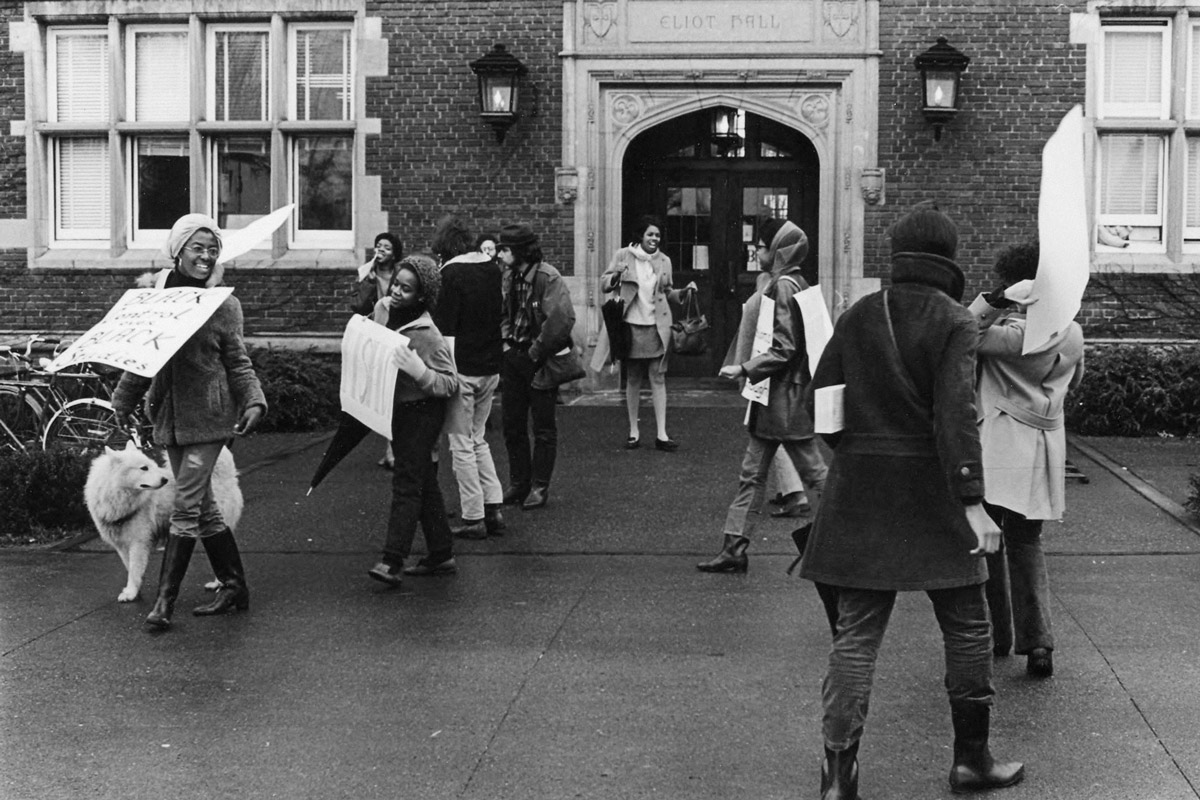Milestones in Black History at Reed
We uncover some of the people and events that have too often been marginalized or glossed over.
1932
Geraldine Turner ’32 becomes Reed’s first Black graduate.
■ ■ ■
1947
Eastmoreland bar refuses to serve Inez Freeman ’48 because she is Black. Incident sparks the “Fair Rose” movement to end discrimination by hotels and restaurants in Portland.
■ ■ ■
1953
Prof William Couch Jr. becomes Reed’s first Black professor.
■ ■ ■
1958
Paul Robeson holds a concert at Reed in the face of McCarthy discrimination.
■ ■ ■
1964
Rockefeller Foundation makes $275,000 grant to help Reed recruit minority students.
■ ■ ■
1968
Formation of the Black Students Union. BSU goes on to occupy Eliot Hall to demand a Black Studies Program.
■ ■ ■
1969
Prof. William McClendon is hired to lead the Black Studies Center.
■ ■ ■
1975
The faculty’s Educational Policy Committee declares that Black Studies is not an essential part of a liberal arts education, effectively ending the program.
Black enrollment hovers near zero.
■ ■ ■
1985
Students occupy President Bragdon’s office to put pressure on Reed to divest endowment from US multinationals operating in South Africa. The trustees ultimately adopt the Sullivan Principles, but do not take the step of full divestment.
■ ■ ■
1988
Linda Howard ’70 (who also founded Renn Fayre) joins board of trustees and pushes for more diversity.*
■ ■ ■
1993
Students create the Multicultural Resource Center (MRC) as a home base to address issues of identity, culture, and oppression.
■ ■ ■
1995
Prof. Pancho Savery [English] joins the faculty. For many years, his Black Athena lecture in Hum 110 is one of the only moments when the Eurocentric nature of the course is challenged.
■ ■ ■
1997
Graham Jones ’97 becomes first Black student body president. He is one of only 7 Black students at Reed.
■ ■ ■
2004
Nooses and graffiti targeting a Black professor spur debate on equity. Ad-hoc committee on diversity formed.
■ ■ ■
2011
Prof. Crystal Williams [English]becomes first Dean for Institutional Diversity.
■ ■ ■
2012
Students found DIY-ALANA (for do-it-yourself African American, Latinx, and Native American Studies) and invite professors to give lectures on subjects such as the Harlem Renaissance.
■ ■ ■
2014
Milyon Trulove becomes Reed’s first Black dean of admission.
■ ■ ■
2015
Civil-rights leader Kathleen Saadat ’74 issues stirring challenge at Commencement. “You must look for places where humanity will be served by deconstructing structures that harm people. And you must help to create new structures. It’s easier to tear it down than to build it back up.”
■ ■ ■
2016
Reedies Against Racism (RAR) begins series of demonstrations and protests.
President Kroger reaffirms longstanding policy and declares Reed a santuary college—one of the key RAR demands.
■ ■ ■
2017
First Hum 110 lecture of the year called off due to interruptions from protestors.
Reed adopts an anti-racism statement.
RAR occupies Eliot Hall.
■ ■ ■
2018
Faculty approves a major in comparative race and ethnicity studies (CRES).
Faculty votes to expand Hum 110 to include units on Harlem Renaissance and Mexico City.
■ ■ ■
2020
Social Justice Research and Education Fund helps students pursue independent projects.
Community Safety launches anti-racism initiative to strengthen diversity and equity training for CSOs.
Juneteenth is official Reed holiday.
■ ■ ■
2021
Black tenured and tenure-track professors include; Mary James [physics], Pancho Savery [English], Mark Burford [music], Derek Applewhite [biology], Samiya Bashir [creative writing], LaShandra Sullivan [anthro], Simone Waller [English], and Leia Harper [psychology]. This list doesn’t include visiting faculty.
*A previous version of this article indicated that Linda Howard ’70 was a BSU organizer. She was not an organizer, but was later a member. We apologize for this error.
Tags: Diversity/Equity/Inclusion, Professors, Reed History, Students
